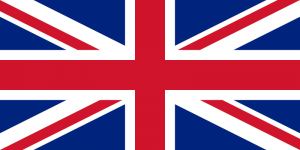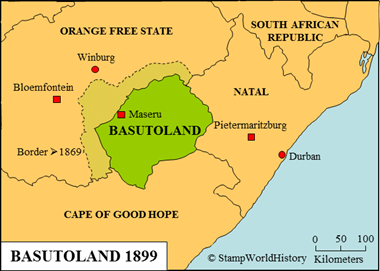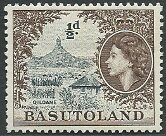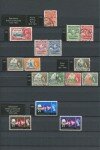
Basutoland
Quick reference
General issues: British protectorate 1933-1965, British protectorate/Self Government 1965-1966
Country name on general issues: Basutoland
Currency: 1 Shilling = 12 Pence 1933-1961, 1 Rand = 100 Cent 1961-1966
Population: 345 000 in 1900, 953 000 in 1965
Political history Basutoland
Basutoland is a kingdom in southern Africa. In the first part of the 19th century, a number of the Sotho tribes – the Sotho are a Bantu people – unite to form the kingdom of Basutoland. In the middle of the 19th century Basutoland is confronted with the Boer trekking into the hinterland of Cape of Good Hope and establishing the Orange Free State. Basutoland asks, and is granted, British protection, thus becoming the protectorate of Basutoland in 1868. British mediation leads to a treaty with Orange Free State in which Basutoland cedes part of its territory and the borders as we know them until today are established. Basutoland is administered from the Cape Colony from 1871 until 1884, then again as a seperate protectorate – one of High Commission Territories together with Bechuanaland and Swaziland. During the Boer Wars around the turn of the century, Basutoland remains neutral and in 1910 Basutoland decides to stay apart from the Union of South Africa formed in that year. Basutoland in 1965 gains self government and in 1966 independence as the kingdom of Lesotho.
Postal history Basutoland
In Basutoland, from 1880, the stamps from Cape of Good Hope are used. These are superseded by those of South Africa in 1910. Stamps for Basutoland are issued from 1933. The stamps are in designs specific for Basutoland in a style that is also found with other British colonies. Basutoland has taken part in many of the omnibus issues for the British Empire. From 1966 the stamps of Basutoland are superseded by the issues of the kingdom of Lesotho.
Album pages
← Previous page: AscensionNext page: Bechuanaland →




I’m not sure what you mean by the statement “These are of the standard design for the British colonies. ” Their designs are unique, and are not of the “key type” issued by many of the British Colonies in the first part of the 1900s.
Tim
Thanks for pointing out that my wording may be confusing here. I will make an adjustment that I hope describes the stamps issued better.